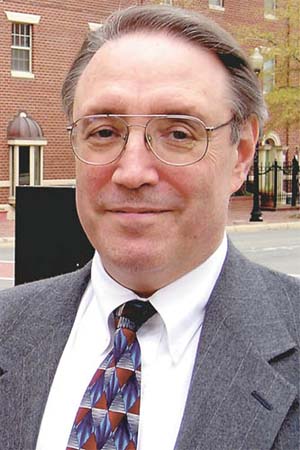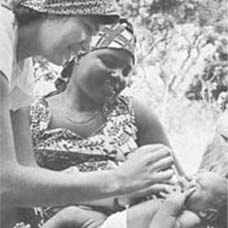
Jury begins deliberations on the 62-count indictment against McLean ‘pain doctor' Dr. William E. Hurwitz, who volunteered as the medical director for Peace Corps Brazil in the 1970s
Hurwitz Takes the Stand
Jury begins deliberations on the 62-count indictment against McLean ‘pain doctor.’
By Ken Moore
December 9, 2004
Some past patients say Dr. William E. Hurwitz saved their lives. Before he found Hurwitz on the Internet, Sylvester Boyd testified Friday, Dec. 3 that he suffered 12 years with "constant, nagging, unrelenting pain — just pain, pain, pain — it nearly destroyed my life."
"I was at the end of my rope. It gets to a point where shockingly suicide is not an option you're willing to dismiss," testified Boyd, 50, who suffered bone fractures, muscle and cartilage tears in his back during a fall at an ice skating party he held for his daughter about 15 years ago.
Boyd was not the only grateful patient.
"Dr. Hurwitz saved my wife's life, said Charles Barnhart, of New Mexico, following his wife Molly Shaw's testimony last Thursday. "I hope she got to the jury; I know every time she talks about it, it gets to me."
PROSECUTORS DON'T DISCOUNT the care some patients received from Hurwitz, 59.
But the 1,879,677 pills prescribed by Hurwitz to just 24 of the 400-plus patients he treated from 1998-2002 led to drug addiction, drug dependency and death, according to Assistant U.S. Attorneys Eugene J. Rossi and Mark D. Lytle.
Kilee Hoskin's uncle, Rennie Buras of New Orleans, died in 1999, under treatment by Hurwitz. "This man built planes and boats and things with his bare hands," testified Hoskin, 25, during the third week of Hurwitz's trial, which began Thursday, Nov. 4. "[Paramedics] thought he was retarded, that's how the pills affected him."
Prescriptions Hurwitz wrote for OxyContin, including the 68,700 total pills he prescribed for Bret McCarter and the 63,530 pills Hurwitz prescribed for Kevin Fuller, led to illegal drug sales in Manassas, other parts of Virginia and Tennessee, according to prosecutors.
More than 15 convicted felons, most from Manassas and many related to each other, testified against Hurwitz.
"I think he enjoyed it. I think he lived vicariously through us," testified Timothy Urbani, 34, who faces 20 years in federal prison for charges including conspiracy to distribute OxyContin and robbery of OxyContin from a pharmacy. "At the time, I thought [the pills] were helping me, but I'm in all this trouble now. … I wasn't there for my kids for three to four years, now I won't be there for a long time."
Hurwitz's defense attorneys Patrick S. Hallinan, Kenneth H. Wine and Marvin D. Miller called the convicted dealers "predators" who abused the doctor's trust, lying about or exaggerating their pain to obtain drugs from the nationally-known doctor who specialized in high-dose opioid therapy for people with unrelenting chronic pain.
FOLLOWING 19 DAYS of testimony, from 63 witnesses for the prosecution and nine witnesses for the defense, Hurwitz took the stand on Monday, Dec. 6, in the United States District Court for the Eastern District of Virginia before Senior Judge Leonard D. Wexler.
Hurwitz testified Monday that he showed all potential patients literature suggesting that "opioid treatment is not for everyone."
"It was an attempt to discourage people from opioid therapy unless they have exhausted other options," Hurwitz testified. "I wanted patients to understand that treatment with opioids was a complicated practice with risks."
Hurwitz, who closed his practice in December 2002, faces a 62-count indictment, including charges of conspiracy to traffic in controlled substances, drug trafficking resulting in death, drug trafficking resulting in serious bodily injury, drug trafficking distributions, engaging in continuing criminal enterprise and health care fraud.
Still posted on Hurwitz's Web site is a request to patients, foreshadowing the possible 20 years in jail or more that he faces for each count of the indictment.
"More than in most clinical circumstances, the failure of patients to act intelligently, responsibly and honestly can lead to disaster," reads the Web site. "For all of these reasons, patients who undertake opioid maintenance therapy should behave in a way that is beyond reproach or suspicion in all matters relating to their use of medications. Patients who are unwilling or unable to do so jeopardize not only their own health and safety, but the health and safety of other patients with chronic pain."
Advocates for patients with chronic, severe pain are watching the trial closely. The treatment of pain is a human rights issue, said Mary Baluss, director of the Pain Law Initiative, who has attended most of the trial.
"I'm worried that high-profile trials will have a negative impact on the treatment of pain," said Dr. Steven Passik after serving as a witness for the defense.
THROUGHOUT THE TRIAL, prosecutors Rossi and Lytle emphasized that Hurwitz deliberately ignored obvious "red flags" of abuse and distribution, giving examples of patients who:
* Gave frequent excuses about lost or stolen prescriptions
* Ran out of medication early
* Tested positive for illicit narcotics
* Tested negative for medications Hurwitz prescribed
* Injected medications, which should have been taken orally
* Had track marks and ulcers on arms
* Showed cocaine rashes on skin
* Reported current or past addiction
* Were arrested for distributing Hurwitz's medications or illicit substances.
Bret McCarter, whose street name was "Mav," testified that he smoked crack before visits to Hurwitz so "I could look straightened out when I made an appearance."
McCarter paid $15,000 to $20,000 a month to fill prescriptions for OxyContin, Dilaudid and Methadone, he testified, and said Hurwitz called him a "high-risk patient."
"At the end, he would always continue writing the prescriptions," McCarter testified.
Hurwitz testified that McCarter was one of his high-dose patients who was treated for pain resulting from failed back surgery. McCarter's mother wrote Hurwitz a letter saying she was subsidizing her son's treatment, Hurwitz testified.
HURWITZ'S TESTIMONYwas scheduled to continue Tuesday with prosecutor Rossi's cross-examination, after The Connection's presstime. Defense attorneys plan to introduce a few more expert witnesses, after Hurwitz’s testimony concludes.
After closing arguments by the prosecution and defense, the jury is expected to begin deliberations later this week.
Hurwitz's attorneys say he is not guilty of any of the charges, that he cared for patients who could not get adequate care elsewhere.
ABOUT 50 PEOPLE including Hurwitz's two daughters, mother and two brothers watched his testimony Monday.
"Imagine the feeling of betrayal," said his brother Kenneth Hurwitz, senior associate with Human Rights First. "He has gone out of his way to help people and give people the benefit of the doubt.
"It all seems so incredibly unjust. If he made mistakes, they were mistakes that were out of his good faith and his attempt to help people," Kenneth Hurwitz said.
From 1998-2002, Hurwitz, who has remained free after posting a $2 million bond, treated more than 400 people for chronic pain. He testified that he terminated treatment for 17 patients, but sometimes continued treatment for problematic patients that he thought he could help.
"I believe all the patients have pain," Hurwitz testified








